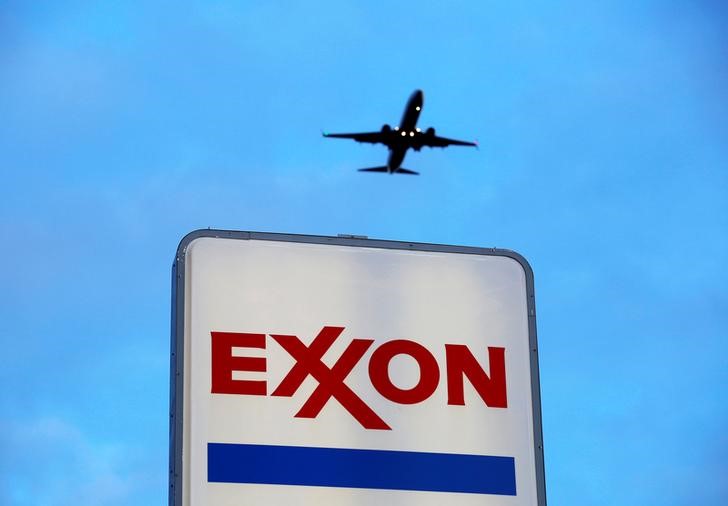By Ahmad Ghaddar and Aref Mohammed
LONDON/BASRA, Iraq (Reuters) - Talks between Exxon Mobil (N:XOM) and Iraq on a multi-billion-dollar infrastructure contract have reached an impasse, Iraqi officials and two industry sources said, in a potential setback to the oil major's ambitions to expand in the country.
More than two years of negotiations on awarding the U.S. firm a project to build a water treatment facility and related pipelines needed to boost Iraq's oil production capacity have hit difficulties because the two sides differ on contract terms and costs, the officials and sources told Reuters.
Unless the differences can be resolved, the project could be awarded to another company in a tender, the officials said, without elaborating on the points of dispute.
Losing the contract could deal a blow to Exxon's broader Iraqi plans, as it would be handed rights to develop at least two southern oilfields - Nahr Bin Umar and Artawi - as part of the deal.
Exxon declined to comment.
Further delays to the project could also hold back the oil industry in Iraq, OPEC's second-largest producer; the country needs to inject water into its wells or risk losing pressure and face severe decline rates, especially at its mature oilfields. As freshwater is a scarce resource in Iraq, using treated seawater is one of the best alternatives.
The Common Seawater Supply Project (CSSP), which would supply water to more than six southern oilfields, including Exxon's existing West Qurna 1 field and BP's (L:BP) Rumaila, was initially planned to be completed in 2013 but has now been delayed until 2022.
"The CSSP would be expensive and challenging but there's opportunity here (for Exxon) ... to get access to resources on a very large scale and to achieve something and really make a difference to its own business," said Ian Thom, principal analyst at consultancy Wood Mackenzie.
Many of the world's biggest oil companies, like BP , Total (PA:TOTF), Royal Dutch Shell (L:RDSa) and Eni (MI:ENI), have operations in Iraq, where a low-return environment and strict contract terms have squeezed returns in recent years.
With total oil production at West Qurna 1 at around 430,000 bpd, Exxon's presence in Iraq is small compared with dominant player BP whose Rumaila oilfield accounts for around a third of the country's total production of around 4.4 million bpd.
While the Texas-based firm is looking to grow in Iraq, its geographical focus remains on the Americas, including U.S. shale fields and Brazil, in contrast to rivals like France's Total and Italy's Eni who have been significantly expanding their activities in the Middle East in recent years.
'ANOTHER APPROACH'
The talks between Iraqi authorities and Exxon are still ongoing, according to the industry sources and officials from the Iraqi oil ministry.
However the state-run Basra Oil Company (BOC), which is overseeing the project, said it could now tender the project this month in a parallel process with the aim of completing a first phase by 2022.
"We have this one approach but we can have another approach as well," Abdul Mahdi al-Ameedi, head of the Iraqi oil ministry's licensing and contracts office, told Reuters.
Iraq chose Exxon to coordinate the initial studies of the CSSP in 2010 [story here https://www.reuters.com/article/iraq-oil-water/iraqs-oil-output-revival-at-stake-for-want-of-water-idUSL6N0RI28H20140917]. At the time, Baghdad aimed to raise its oil production capacity to 12 million barrels per day (bpd) by 2018, rivaling Saudi Arabia. That target has been missed and now been cut to 6.5 million bpd by 2022 from around 5 million bpd now.
"Iraq can probably get to 5.5 million bpd production without a major seawater supply project, but I think they will struggle to get to 7 million bpd," said Thom.
Negotiations with Exxon fell through in 2012 due to red tape and cost disputes. In 2015, the company reentered talks with the oil ministry, this time in partnership with China's CNPC and with the CSSP folded into a much bigger development project known as the Integrated South Project. [story here https://www.reuters.com/article/us-opec-oil-exclusive/exclusive-opecs-new-price-hawk-saudi-arabia-seeks-oil-as-high-as-100-sources-idUSKBN1HP1LB]
CNPC did not reply to a request for comment.
For Iraq, going down the non-Exxon route raises two major concerns: how to integrate the project between the water treatment facility and the oilfields and how to finance the project, Thom said.
Two Iraqi oil sources told Reuters that taking the non-Exxon path would raise financing concerns for Iraq.
"If you decouple it, it's not the same project," one of the industry sources said of a non-integrated project.
Projected costs of the scheme have not been disclosed.
ILF Consulting Engineers, which did the front end engineering and design (FEED) for the project in 2014 based on treating 12.5 million bpd of seawater transported to six oilfields, put the cost at $12 billion.

The capacity has been revised downwards, with the first phase set to have a 5 million bpd of water, and in the second phase an additional 2.5 million bpd of water will be added for additional fields.